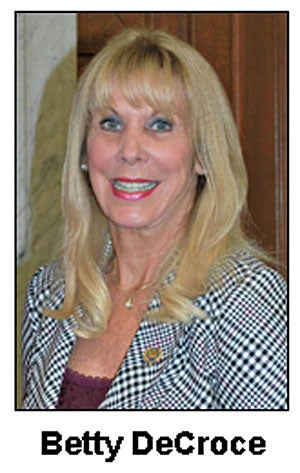New Jersey lawmaker calls for tougher standards on assisted living facilities

Seven times. Alice Bisson suffered abuse at an assisted living faculty on seven separate occasions before it was finally reported.
 Now, Assemblywoman BettyLou DeCroce (R) has been galvanized to action by the family tragedy she feels certain could have been prevented.
Now, Assemblywoman BettyLou DeCroce (R) has been galvanized to action by the family tragedy she feels certain could have been prevented.
Several years ago DeCroce was notified when her mother, Alice, was rushed to Morristown Memorial Hospital with a broken hip and a femur fracture so severe that a metal rod needed to be inserted in her leg.
But what the New Jersey lawmaker later discovered was this was not the first injury, just the worst one. Yet it was the only time she had been informed.
Together with Assembly Speaker Emeritus Sheila Oliver (D), DeCroce will soon introduce Alice’s Law – bipartisan legislation that will hold assisted living facilities to the same legal standards as full-fledged nursing homes.
DeCroce, who sits on the Assembly’s Health and Senior Services Committee, said the bill is vital to protecting individuals living in assisted living residences.
“Here I am in a place where I can make a difference and shame on me if I don’t,” she stated.
When a loved one can no longer safely age in place, many families face the heart wrenching decision to entrust their care to another — usually a for-profit corporation with little government oversight.
Alice’s Law will change that.
How the laws differ for Assisted Living
It might surprise you to know that regulations concerning assisted living facilities differ from nursing homes.
That’s because nursing homes receive most of their funding from Medicare and Medicaid, so they are regulated at both the state and federal level.
But this isn’t the case for assisted living facilities, which are privately paid by the residents in their care.
One of the most glaring contrasts is that residents (or family acting on their behalf) cannot sue the facility for injury, abuse or neglect under the state’s Nursing Home Responsibilities and Rights of Residents Act (NHRRRA).
Many these facilities are part of a larger out-of-state corporate chain, but even protections found in federal regulations like the Omnibus Reconciliation Act of 1987 (OBRA) 42USCA 1396R, also known as the Nursing Home Reform Act, do not apply.
“That’s why this law is needed,” DeCroce said.
New Jersey does have regulations for assisted living residences that establish a standard of care (NJAC 8:36). Enforcing these standards though, is another issue.
“There really are not a lot of protections that have teeth in them,” explained attorney Donna Russo, of Russo and Kieck, a law firm that specializes in nursing home and assisted living abuse cases.
Alice’s Law
The new bill will create a statutory cause of action for certain harms suffered by an assisted living resident.
That means, if a resident is hurt and there is a demonstrated lack of responsibility on the part of the facility, then the facility can be sued and even face criminal charges.
Besides a clear penalty for incidents of proven negligence and abuse, Alice’s Law will also address the need for more transparency by having such events posted on assisted living websites.
Violations history for nursing homes is available to the public via a national comparison website, but nothing like that currently exists for assisted living facilities.
After the legal language for Alice’s Law is drafted, DeCroce and Oliver plan to hold hearings to learn of others’ experiences in order to strengthen the bill and make it more comprehensive.
They hope to see the bill pass next year, but DeCroce said she expects plenty of push back from assisted living providers.
Alice’s story
Alice’s Law is DeCroce’s tribute to her mother.
Like many adult children with aging parents, DeCroce found herself in the role of caregiver.
And when the physical demands of daily care giving became overwhelming, she and her brother made the difficult – and expensive – choice of moving Alice into an assisted living residence.
They settled on Sunrise of Randolph. The place was beautiful, DeCroce remembers; everything appeared to check out and the staff seemed warm and attentive.
Even better, Alice was able to retain her primary care physician who made house calls at the facility. He recommended the move both for Alice’s well being and the family’s peace of mind, DeCroce shared. She and her brother were always nearby and frequent visitors. The arrangement was working out well.
Then came the call that changed everything.
DeCroce learned that it was another Sunrise resident who had attacked Alice and caused the fall. That resident was subsequently removed from facility and forced to undergo a psychological evaluation.
Yet during her mother’s rehabilitation, Alice’s attacker had somehow been allowed to return to Sunrise. DeCroce was shocked that her family had not been contacted nor permitted any input on the decision.
That was only the start.
Per state regulations, local police were notified as was the New Jersey Department of Health Department, who, in turn, told DeCroce that they were investigating the matter.
Her shock would soon turn to horror, however, when the police department warned that there was much more to the case.
Only after obtaining Alice’s medical records did DeCroce learn she had been attacked by the same person six other times.
Worse, none of those prior attacks were reported to the family.
“Think about your Mom, your Dad [suffering this]. That’s the horror that went across me,” she recalled.
Seven times is ”neglect”
Alice never fully recovered and spent her final years wheelchair bound until she died this past April.
Her family doesn’t blame the attacker whose mental faculties were clearly diminished. Instead, they feel the responsibility to keep both Alice and her attacker safe and protected lies entirely with the facility providing their care.
“One time is an accident, seven times is neglect,” DeCroce asserted.
But there were no consequences for Sunrise, even though the facility had violated New Jersey assisted living regulations, DeCroce said. The family’s only recourse was a civil lawsuit which was settled out of court in 2014.
Sunrise Senior Living, LLC was contacted for their account, and issued the following statement:
“Due to privacy considerations, we are unable to share details regarding specific individuals or events. We cherish each of our residents and constantly strive to provide them with the best possible home.”
WHYY is your source for fact-based, in-depth journalism and information. As a nonprofit organization, we rely on financial support from readers like you. Please give today.




